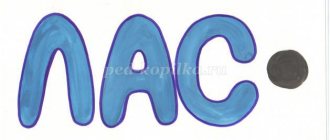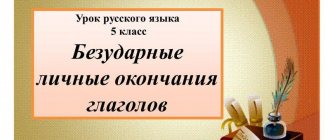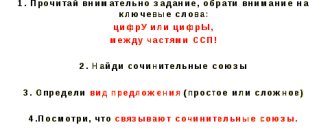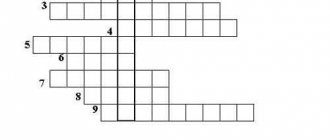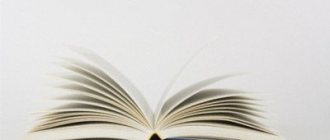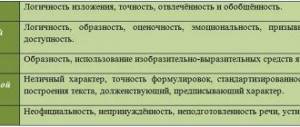Work program “Developing the gift of speech”
Work program for extracurricular activities in the Russian language “Developing the gift of speech.”
6th–7th grades
Explanatory note
The work program for extracurricular activities in the Russian language “Developing the gift of speech” was developed on the basis of the Federal State Educational Standard for Basic General Education, the Concept of Spiritual and Moral Development and Personality Education of a Russian Citizen, the planned results of basic general education, taking into account interdisciplinary and intradisciplinary connections, in accordance with the goals and objectives of the educational program of the MBOU "Malokudarinskaya Secondary School", an exemplary program for extracurricular activities.
There is nothing more powerful than words. Teaching schoolchildren to correctly use this wonderful gift given to them, instilling interest in cognitive activity, developing curiosity and the desire for speech self-improvement is an important and necessary task facing the teacher. The task is not new, but now it goes far beyond the educational framework, since with the introduction of educational standards of a new generation, the requirements for the students themselves have changed. Today, a graduate graduating from a secondary educational institution is focused on continuous education and self-education, motivated by creativity and social activity. And he needs to be fluent in oral and written speech in order to organize his whole life, so that through communication and competent writing he can say exactly what he wanted, convey to another part of his “I”.
Justification of the relevance and novelty of the program
The relevance of choosing the extracurricular activity program “Developing the Gift of Speech” is dictated by the needs of practice, since it makes it possible to consolidate the knowledge and skills acquired by teachers in the classroom, and at the same time involve students in systematic research and project activities focused on creative self-realization and socialization. And the novelty of the program concerns practice, because it is interesting to observe what changes occur in students during creative activity, how their behavior and abilities change, what unexpectedly opens up in them and what they discover in themselves.
The program allows schoolchildren to see the diverse, fascinating, inexhaustible world of words, which is important for the formation of true cognitive interests, and is a support in preparing for Olympiads in Russian language and literature. Helps to successfully apply an individual approach to each student, taking into account his abilities, to develop both independence and creative initiatives.
General characteristics of the program
Program
develops all types of speech-thinking activities:
communicative
(possession of the culture of oral and written speech, skills and abilities of using language in vital areas and communication situations for students),
intellectual
(comparing and contrasting, correlating, synthesis, generalization, abstraction, evaluation and classification),
informational
(the ability to work with text, find and extract information from various sources),
organizational
(the ability to formulate the goal of an activity, plan it, carry out self-control, self-assessment, self-correction).
Goal and objectives of the program
Target -
creating the necessary speech environment for creative self-realization and socialization of students.
Tasks:
Educational:
- development and formation of linguistic personality;
- developing interest in the native word and the content of extracurricular activities;
- developing an understanding of the importance of the language being studied in the modern world and the need to use it as a means of communication, cognition, self-realization and social adaptation;
- creating a situation for achieving success in individual and group activities;
- expansion of knowledge, abilities, skills in sections of the science of language (phonetics, vocabulary, phraseology, word formation, morphology, syntax);
- developing the creative abilities of schoolchildren to create oral and written texts of different types, speech styles and genres, taking into account the intent, addressee and communication situation;
Educators:
- nurturing love and respect for the native language;
- developing the ability to listen and understand text;
- nurturing the need for speech self-improvement.
Educational:
- develop the ability to freely use various types of dictionaries, reference books and search editors on the Internet;
- develop ideas about beauty in language and speech;
- involve students in independent research work.
The program of extracurricular activities allows for the implementation of personality-oriented, systemic and activity-based approaches.
Features of the program
The program has three semantic blocks:
1) “The path to the word”;
2) “From word to text”;
3) “From the finished text to your own text.”
The “Path to the Word” block leads students to comprehend their vocabulary and enrich it with new words, helps to improve language culture, form an attentive attitude, respect and love for their native word. In an entertaining form, the tasks introduce the word simultaneously in five aspects: spelling, lexical-semantic, orthoepic, syntactic and etymological. Words are interesting for children; in them they find a new, previously unknown meaning.
Words are studied in thematic areas, for example: “The Word about the Motherland” (“… about space”, “… about childhood”, “about the world...”, “… about life”, “… about man”, “… about memory”, “...about conscience”). They are considered in the structure of phrases, sentences, and small texts.
Selection of synonyms, antonyms, choice of more precise words to express your thoughts that correspond to the style of expression, creative tasks - and this is working with words. Through the word, the mastery of words, schoolchildren discover all the beautiful things that life gives us.
The “From Word to Text” block gives an idea of the text, of such non-traditional genres of school essays as letters, reviews, essays, annotations, and reviews. Students delve into the content, meaning, and logic of the statement, look for connections, that is, they realize everything that affirms the unity of the text. Undoubtedly, in the process of working with text, students’ communicative competence is formed and the gift of speech is developed. At this stage, work is carried out with texts that contribute to the spiritual and moral development of students, corresponding to the age characteristics of schoolchildren, at the same time containing something new intellectually and emotionally and, if possible, relevant at the time of use. These can be texts about famous people, science, words, dictionaries. Work on the text begins not with its analysis, but with an analysis of the children’s perception. They talk about themselves: about their feelings, experiences, sensations; they try to understand why they feel and think the way they do. Without expressing one's own state and mood, it is impossible to teach children to truly feel the word and speak it well. After all, for every person, the most interesting thing, ultimately, is himself. The text for analysis should be related to the experienced interest and vivid impression. The text allows students to develop both their speech and their logical thinking, independence, teaches them to think, and strive for creativity. Creativity is a norm of child development.
The next block of the program, “From ready-made text to own text,” helps to increase the creative potential of schoolchildren and enrich their active vocabulary. Teaches you to logically express thoughts and express them in writing, which is a big problem for students. They are invited to create texts that reveal their own position in life, certain relationships, for example, to some phenomena of reality or human qualities. Creative works reflect the student’s inner world; they can be used to trace the student’s development, the formation of his worldview, and attitude to life.
The result of all the work being done is a collective project: the creation of a collection of creative works by students “Word Workshop”.
The program of extracurricular activities allows us to identify the individual characteristics of each student, carry out work with the maximum interest of students, and achieve creative satisfaction and desire for further self-development in each student.
The search for personal changes, personal dynamics is the value of the developed program.
The organization of student activities is based on didactic principles:
- the principle of psychological comfort;
- the principle of continuity of education and development of the student’s personal qualities;
- principle of variability;
- the principle of combining collective, group and individual forms of work;
- the principle of connection between theory and practice;
- principle of creativity.
This course allows you to most successfully apply an individual approach to each student, taking into account his abilities, and more fully satisfy the cognitive and life interests of students.
Forms of organizing classes
- lectures, conversations, trainings;
- excursions to the library;
- games-competitions, quizzes, KVN;
- practical exercises using game elements, didactic and handout materials, proverbs and sayings, counting rhymes, crosswords, puzzles, fairy tales;
- text analysis;
- independent work (individual and group.) Students’ interest is supported by well-chosen texts (for example, “The Parable of the Talents”), introducing a creative element into classes (explain the saying “I buried the talent in the ground”), linguistic games, independent compilation of crosswords, puzzles, charades, puzzles.
Activities
- search and research;
- gaming;
- educational;
- problem-value communication.
Basic methods and technologies
- project-based learning;
- personal self-development;
- developmental training;
- collaborative learning technology;
- gaming technologies;
- information and communication technologies.
The choice of technologies and methods is determined by the need to differentiate and individualize learning in order to develop universal learning activities and personal qualities of the student.
The “Developing the Gift of Speech” program for students in grades 6–7 is designed for 1 year (35 hours), and is implemented through a plan of extracurricular activities. Classes are held once a week on Wednesday with 6 lessons.
Requirements for the planned results of studying the program
The future self-determination of a student and his successful creative self-realization largely depend on the desire to acquire new knowledge and skills. At the same time, communication skills, self-control and self-esteem, and the development of creative abilities are important. The program of extracurricular activities “Developing the gift of speech” is aimed at developing the personal, meta-subject and subject results of students.
Requirements for the level of training of students
Personal results
- awareness of the aesthetic value of the Russian language; respect for the native word;
- skill feel
beauty and expressiveness of speech,
the desire
to improve one’s own speech; - Love
and
respect
for the Fatherland, its language, culture; - interest
to reading, to conducting a dialogue with the author of the text;
need
for reading; - interest
to writing, to creating your own texts, to written communication;
- awareness
responsibility for the spoken and written word.
Meta-subject results
Regulatory UUD:
- independently formulate the topic and goals of the lesson;
- draw up a plan for solving an educational problem together with the teacher;
- work according to plan, checking your actions with the goal, adjusting your activities;
- in dialogue with the teacher, develop evaluation criteria and determine the degree of success of one’s own work and the work of others in accordance with these criteria.
Cognitive UUD:
- process and transform information from one form to another (make a plan, table, diagram);
- use dictionaries and reference books;
- carry out analysis and synthesis;
- establish cause-and-effect relationships;
- build reasoning;
Communication UUD:
- adequately use speech means to solve various communicative tasks; master monologue and dialogic forms of speech.
- express and justify your point of view;
- listen and hear others, try to accept a different point of view, be ready to adjust your point of view;
- negotiate and come to a common decision in joint activities;
- to ask questions.
Subject results:
- an idea of the Russian language as the language of the Russian people, the state language of the Russian Federation, a means of interethnic communication, consolidation and unity of the peoples of Russia;
- understanding the determining role of language in the development of an individual’s intellectual and creative abilities, in obtaining an education, as well as the role of the Russian language in the process of self-education;
- developing skills in creating your own text in various genres of journalism and fiction;
- carrying out various types of word analysis, multidimensional analysis of the text from the point of view of its main features and structure, belonging to certain functional styles;
- extracting the necessary information from dictionaries, using it in various activities
Work program of the extracurricular activity course “The Amazing World of Words”
develop ingenuity and intelligence;
introducing schoolchildren to independent research work;
develop the ability to use a variety of dictionaries;
teach the organization of personal and collective activities when working with a book.
“The Amazing World of Words” is a course of extracurricular activities for primary schoolchildren, the content of which examines the orthoepic, lexical, grammatical diversity of the world of words, the basic methods and ways of knowing it, and also develops linguistic intuition and artistic and figurative thinking of primary schoolchildren. The study of this course creates conditions for the formation of students’ value attitude towards language, for instilling responsibility for observing the norms of the language as an important component of language culture.
The work program of the course complements and expands the content of individual topics in the subject area of Philology by deepening knowledge of linguistic and local history, introducing elements of etymology and cultural studies.
Planned results of studying the course
In the process of studying the course “The Amazing World of Words”, students gain knowledge about the history of the Russian language, examine monuments of ancient writing, get acquainted with the origin of words, which becomes a prerequisite for instilling pride in the beauty and greatness of the Russian language, understanding their own role in the knowledge of language laws, the need to learn various ways of knowing linguistic units. Practical use and familiarity with the norms of using language units in speech contributes to the development of personal responsibility for the purity and correctness of created statements. The activity-based approach used in the course not only develops cognitive interest, but also creates motivation for in-depth study of the Russian language course.
The system of questions and tasks, the use of various methods of language acquisition enable students to find ways to solve research and creative problems. Searching for information about the origin of words, working with dictionaries, clarifying and correcting speech errors allow us to solve problems of self-testing and self-assessment. A variety of gaming and practical activities allow you to better study phonetics, word formation and grammar.
To master the logical actions of analysis, synthesis, observation and generalization, establishing cause-and-effect relationships and analogies, classification according to generic characteristics, the course contains tasks that activate the intellectual activity of students: it is proposed to compare the spellings of letters, outdated and new words, methods of ancient and modern addresses ; analyze, establish the necessary connections, summarize the material when working with the category of number of a noun, with members of a sentence, etc.
